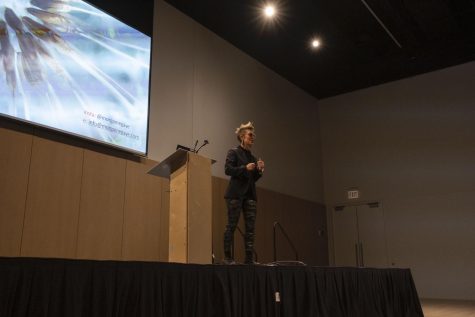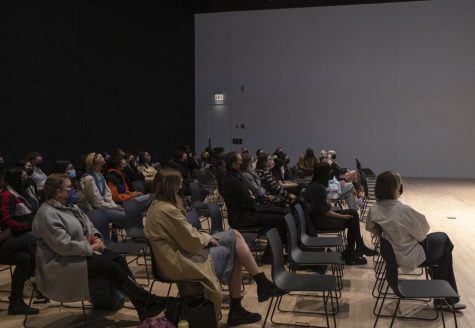Food futurologist Morgaine Gaye talks food, predictions and more in Student Center event
March 11, 2022

While some people may not consider what they are eating for lunch to be important beyond just satisfying their hunger, Morgaine Gaye, a London-based food futurologist, entrepreneur and full-time trend consultant, would disagree.
In a two-hour talk at the Student Center, 754 S. Wabash Ave., on March 3, Gaye explored all the facets of future food trends: why we eat what we eat, believe what we believe and what the future of food looks like.
“This is food futurology in a nutshell: It’s an art and a science. It analyzes food trends, indicators, geopolitics, ecology, fashion, interiors, design, human behavior. I observe things, which we all see,” Gaye said. “I perhaps maybe notice more or pay attention more. All of this drives consumption. It drives everything: the packaging and food trends and all trends.”
Gaye studies culture to predict different trends. By doing this, she is able to offer insight to different industry leaders, who may use her predictions to determine what products they should market and consumers will purchase.
Gaye has predicted a variety of events: from her most controversial prediction of former President Donald Trump being elected into office to what she sees as her most shocking prediction — a future containing hazmat suits and face masks.
“I’ve done different talks in 2018 and 2019, and I showed people pictures of people in masks, and I showed people pictures of hazmat suits, and I showed viruses,” Gaye said. “I didn’t know about COVID. I had no idea, but I said, ‘When 2020 comes, business will never be the same again. Your lives will change.'”
Gaye said forecasting the future can be difficult as people are more inclined to predict what they know and are familiar with.
“When I did this in 2019 and I spoke to students, I said, ‘What’s going to happen in a couple years?’ None of them said, ‘Oh, we’re going to be at home in masks,'” Gaye said. “It just went through more of the things that we already had because that’s pretty normal. That’s what we’re trained to do because we want comfort, and we want familiarity.”

Gaye also said other futurologists she’s spoken to are almost all men, which has challenged her to have to have an edge.
“I can’t think of an example where there’s been another woman. I know from what we get paid that I definitely get paid less. It’s just the deal,” Gaye said. “I have to really have an edge to be able to stand up and say, ‘I’m going to own this space and take the space.'”
Larissa Eastman, a first-year marketing major who came to the event for extra credit, left the talk interested in more than just extra points in her “Trendspotting” class.
“It was a really interesting topic. I had never really heard of the future of food,” Eastman said. “I didn’t really know it was something that you could spot in the future … so I’m really glad I came. It was really interesting. I learned a lot, especially with how fashion and food trends kind of go hand in hand.”
Jessica Abramovitz, a senior fashion studies major, saw an invite for the event back in January and was intrigued.
“I’m always really interested in the future,” Abramovitz said. “It’s not just about food or product. It’s all interconnected with politics and society and all that.”
As someone who wants to go into fashion design, Abramovitz recognizes the impact of consumption.
“Food definitely impacts everything that we do,” Abramovitz said. “It’s another item that we consume, and I’m always keeping an eye on how trends are changing and the why behind everything.”







